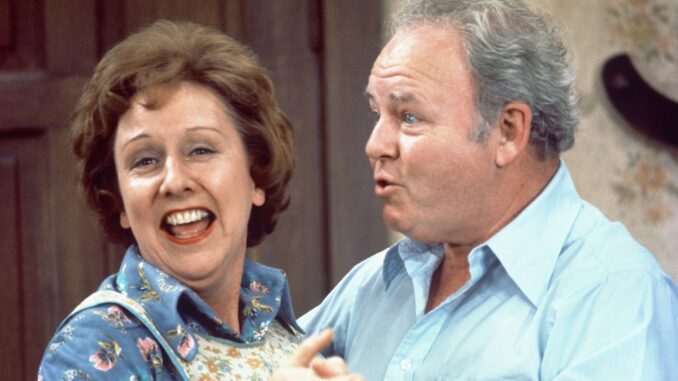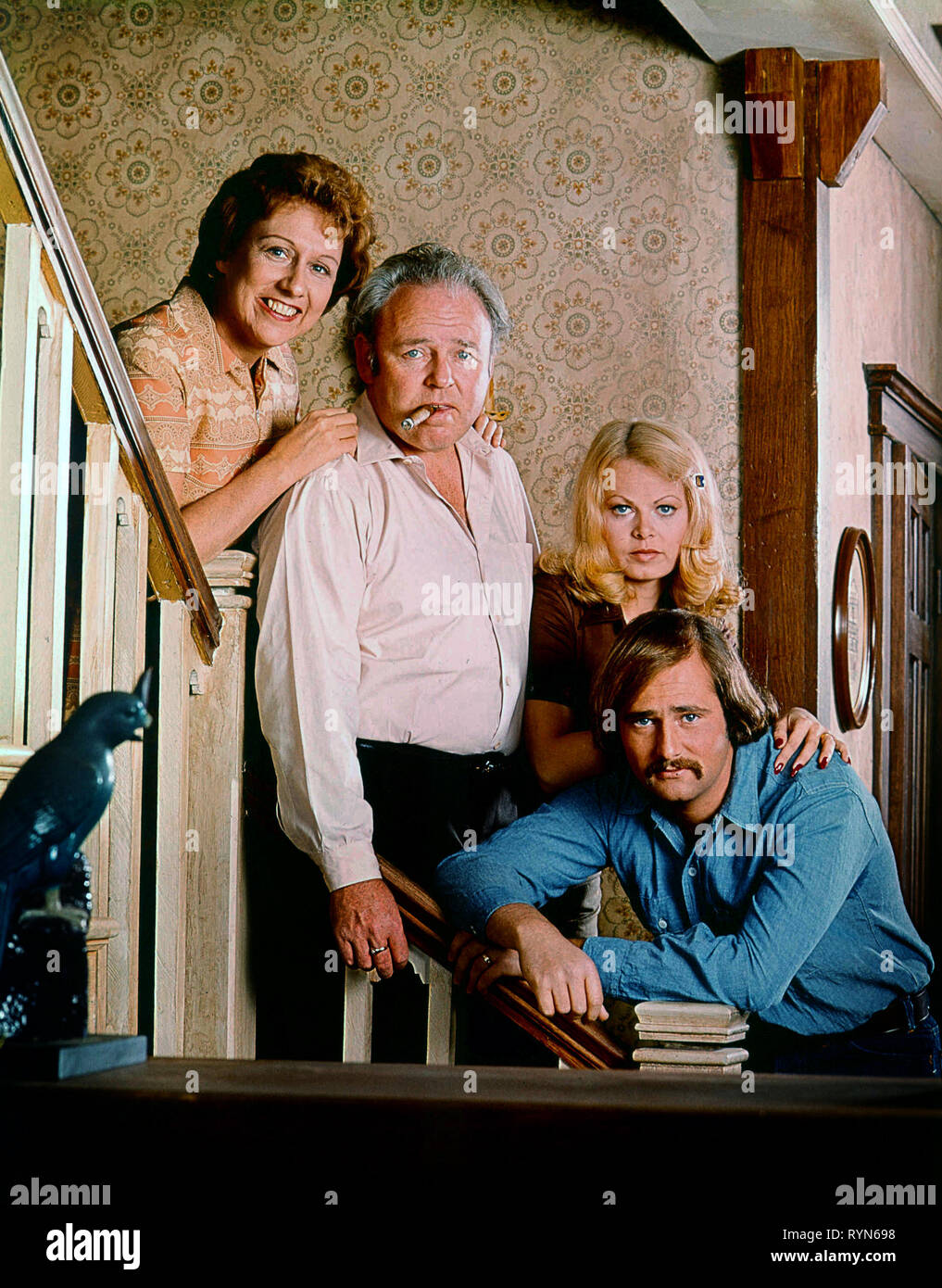
How ‘All in the Family’ Spawned the Most Spinoffs of Any Sitcom
When All in the Family first premiered on January 12, 1971, no one could have predicted how transformative the show would be—not just for television, but for the sitcom genre itself. In many ways, All in the Family was a cultural revolution. With its raw, honest portrayal of social issues like race, gender, and class struggles, it pushed boundaries in ways no sitcom had before. But perhaps one of its most impressive legacies is the incredible number of spinoff shows it spawned.
In fact, All in the Family holds the record for the most spinoffs of any sitcom in television history. What made this groundbreaking show so influential, and why did it inspire so many successful spinoffs? Let’s take a deep dive into the remarkable impact All in the Family had on the TV landscape, and how it set the stage for some of the most iconic sitcoms of the 1970s and beyond.
A Cultural Revolution: How ‘All in the Family’ Changed TV Forever
Before All in the Family, sitcoms were known for their wholesome family dynamics and lighthearted comedy. The television landscape was filled with shows like The Brady Bunch, Leave It to Beaver, and I Love Lucy, all of which focused on idealized versions of family life. But in 1971, All in the Family broke that mold with its politically incorrect humor and its unapologetic tackling of controversial issues.
The Power of Archie Bunker
At the heart of All in the Family was its central character, Archie Bunker, played by Carroll O’Connor. Archie was a working-class, conservative man with outdated views that often clashed with the more progressive members of his family. His character was a force of nature—both funny and offensive in equal measure. His bigoted remarks were frequently the subject of controversy, yet they also served to shine a light on the real prejudices present in American society at the time.
The brilliance of All in the Family was that it took these heavy topics and addressed them with humor, forcing audiences to confront uncomfortable truths about racism, sexism, and classism. This fearless approach made the show both groundbreaking and hugely popular, ultimately leading to a slew of successful spinoffs that continued to build on its social commentary.
The Jeffersons: Moving on Up to TV’s Big Leagues
One of the most successful spinoffs of All in the Family was The Jeffersons, which premiered in 1975. The show centered around George and Weezy Jefferson, a middle-class African American couple who had “moved on up” to a fancy high-rise apartment in New York City. The show’s comedic premise allowed it to explore issues of race, class, and upward mobility while keeping the humor sharp and relatable.
Race and Class in a New Context
While All in the Family focused on the prejudices of working-class whites, The Jeffersons flipped the script by showing African Americans living in an upscale environment, something rarely seen on television at the time. George Jefferson, played by Sherman Hemsley, was unapologetically proud of his success, often clashing with his wealthier neighbors while offering biting commentary on racial and class dynamics.
The show’s lasting impact was not just about its depiction of African Americans achieving success, but also about how it dealt with the realities of race and prejudice in America. The Jeffersons ran for 11 seasons and became one of the longest-running sitcoms in TV history. The show’s success made it one of the best examples of how a spinoff could carve out its own identity while maintaining the spirit of the original series.
Maude: A Feminist Icon on TV
Another iconic spinoff of All in the Family was Maude, which premiered in 1972. The show focused on Maude Findlay (played by Bea Arthur), a strong-willed, liberal feminist who often clashed with the more conservative characters around her. Maude was an outspoken advocate for women’s rights, and the show didn’t shy away from tackling controversial issues such as abortion, gender roles, and divorce.
Feminism Meets Comedy
One of the most groundbreaking episodes of Maude was when the character of Maude decided to have an abortion. At the time, the topic of abortion was a hot-button issue, and it was virtually unheard of to address it openly on television. The episode sparked widespread controversy, but it also helped shift the conversation around women’s reproductive rights in the media.
Maude was both a critical and commercial success, running for six seasons. Its unapologetic take on feminism and its ability to tackle difficult topics head-on made it one of the standout spinoffs from All in the Family.
Good Times: A Bold Depiction of Black Family Life
Good Times, which debuted in 1974, was yet another spinoff of All in the Family that became a major hit. The show focused on the Evans family, an African American family living in a Chicago public housing project. While Good Times primarily tackled issues of poverty and systemic racism, it also showcased the strong bonds of love and support within the family unit.
The Realities of Poverty and Race
The series brought to light the struggles faced by African American families in lower-income communities, addressing issues such as unemployment, violence, and limited access to opportunities. At the same time, it portrayed the strength and resilience of the Evans family, particularly Florida Evans (played by Esther Rolle), the matriarch who worked hard to provide for her children despite the difficult circumstances.
The character of JJ Evans (played by Jimmie Walker), with his catchphrase “Dy-no-mite,” brought levity to the series, but the show never shied away from its serious themes. Good Times became a cultural touchstone and lasted for six seasons, making it one of the most beloved spinoffs of the 1970s.
The Far-Reaching Influence of ‘All in the Family’ Spinoffs
What made the spinoffs of All in the Family so successful wasn’t just the connection to the original show but the way they tackled important social issues in their own right. Each spinoff explored themes of race, class, gender, and family, providing both humor and social commentary in a way that was relatable to viewers across the country.
A Legacy of Spinoffs That Shaped TV
Beyond The Jeffersons, Maude, and Good Times, there were even more shows linked to All in the Family’s success, including Archie Bunker’s Place and 704 Hauser, which further solidified the idea that a single sitcom could inspire a long-running, diverse array of shows.
All in the Family broke new ground not only with its groundbreaking content but with the way it influenced the entire sitcom landscape. By demonstrating that television could simultaneously entertain and provoke thought, it paved the way for future shows to explore complex themes, while also spawning an impressive array of spinoffs.
Conclusion: The Unmatched Legacy of ‘All in the Family’
All in the Family was not just a sitcom; it was a cultural phenomenon that redefined television. The show’s ability to explore sensitive issues with humor and raw honesty made it a powerful force in TV history. More than just a hit show, it inspired a long line of spinoffs, each of which continued the legacy of challenging social norms while entertaining audiences.
From The Jeffersons to Maude and Good Times, the spinoffs of All in the Family became cultural landmarks in their own right, exploring race, class, gender, and family dynamics in groundbreaking ways. The enduring success of these spinoffs is a testament to the power of Norman Lear’s vision and the lasting impact of All in the Family on television.
Frequently Asked Questions (FAQs)
1. Why did All in the Family have so many spinoffs?
All in the Family was a cultural phenomenon, and its ability to address relevant social issues with humor made it highly influential. This led to several spinoffs that continued to explore similar themes with new characters and perspectives.
2. Which All in the Family spinoff was the most successful?
The Jeffersons was by far the most successful All in the Family spinoff, running for 11 seasons and becoming one of the longest-running sitcoms in TV history.
3. What was the significance of Maude’s abortion episode?
The abortion episode of Maude was groundbreaking because it addressed a hotly debated social issue at a time when it was rarely discussed openly on television. The episode sparked controversy but also helped shift the national conversation about women’s reproductive rights.
